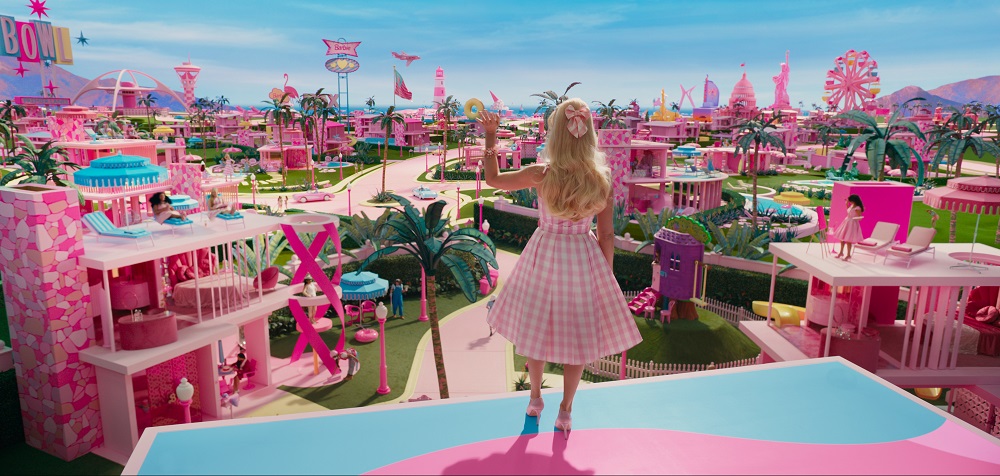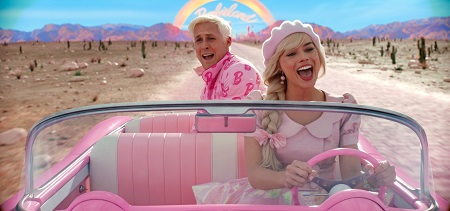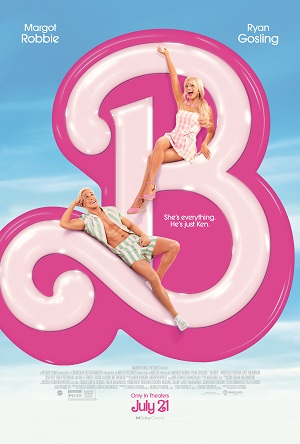
Perfectly Pink Barbie is a Phantasmagorical Triumph
If one threw Playtime, The Umbrellas of Cherbourg, Singin’ in the Rain, Sabrina, Young Frankenstein, and Josie and the Pussycats into a blender and poured the contents into a glass, it’s likely that the pink-colored concoction would look a lot like Greta Gerwig’s Barbie. The Oscar-nominated Lady Bird and Little Women hitmaker has returned with a vengeance, toy giant Mattel and the studio bosses at Warner Bros. having seemingly given the director far more creative freedom than one may have thought possible when she signed on to helm the $100 million-plus production.
In Barbie Land, all of the Barbies and Kens (along with the random Midge, Skipper, and Allan) live in blissful harmony. Each day in their plastic paradise is full of sunshine and rainbows. They wave to one another each morning inside their see-through dreamhouses, frolic at the beach, and have massive dance parties — which always culminate in another energetic “girls’ night” for all the Barbies while the Kens go off to, well, somewhere. No one really knows.
But Stereotypical Barbie (Margot Robbie) has begun to wonder if this is all life has to offer. She’s having some sort of existential crisis, ruminating on death, and starting to suffer odd patches of cellulite seemingly out of nowhere. Weird Barbie (Kate McKinnon) urges her fellow doll to head off into the “real world” to find the answers to all her questions. Stereotypical Barbie is surprised to find a blonde Ken (Ryan Gosling) who is eager to join her on a quest that will lead all the way to the Mattel corporate offices and a meeting with its nonplussed CEO (Will Ferrell), who doesn’t act too terribly surprised to see the company’s iconic doll suddenly standing before him.
Gerwig, cowriting the screenplay with frequent collaborator Noah Baumbach (Frances Ha), pulls out all the stops. The Barbies of Barbie Land come in all shapes and sizes, featuring practically every iteration of the doll created over the past six-plus decades. They are portrayed by a variety of familiar faces, including Alexandra Shipp, Issa Rae, Emma Mackey, Dua Lipa, Hari Nef, and Ritu Arya. They are doctors, lawyers, astronauts, delivery drivers, Supreme Court justices, and even the gosh-darn president. It’s a suitably eclectic group, and Gerwig goes out of her way to make sure all of them are unique in one memorable form after another.
The Kens are all variations on the same theme: well-shaped male matinee idols, all vying for the attention of one of the Barbies. Joining Gosling as eye-catching accessories are the likes of Simu Liu, Kingsley Ben-Adir, and Scott Evans, and all of them have far more to do than is initially hinted at during the film’s delightfully wacky opening act. Also making an impression is Michael Cera as the only Allan. His reaction to Stereotypical Barbie and Ken’s return from the real world builds to a supremely funny outburst of truthfulness that’s laced with a somewhat shocking level of acidic observational commentary I honestly did not see coming.
Yet that’s Barbie. Sure, the film is a phantasmagorical triumph, with production designer Sarah Greenwood (Atonement) and costume designer Jacqueline Durran (Anna Karenina) delivering on a level that’s about seven steps beyond spectacular. But it is the human aspect that makes what Gerwig is doing resonate. This is a slyly eviscerating social commentary. Better yet, the filmmaker tackles a bevy of complex topics, most notably ones involving the patriarchy, feminism, consumerism, and stereotypical gender roles, in ways that are easily digestible for audiences of almost — emphasis on “almost” — any age.
Robbie is stunning. Her reaction to seeing that the real world is not the female-driven paradise of equality and friendship that living in Barbie Land has led her to believe it is is earthshattering. Even better is a moment where Barbie’s complex, not exactly pleasant history is unleashed upon her with the sort of fire-and-brimstone candor only an angrily cavalier middle schooler (wonderfully portrayed by newcomer Ariana Greenblatt) can deliver. Robbie’s reactions are so authentically honest and touching that I was nearly moved to tears, and this only helps augment the character’s growing determination to set things right (in both Barbie Land and the real world) later on.
Gosling is equally tremendous. This may be the actor’s best comedic performance to date, which is saying something for anyone who has seen The Nice Guys. His giggly glee in learning all about the male-dominated real world is a gigantic treat, and while his Ken learns all of the wrong lessons and becomes moderately obsessed with crafting a Stepfordized, patriarchal, horse-loving utopia, Gosling’s good-natured himbo cluelessness is a poetic thing of beauty.
Then there is America Ferrera. She is Gerwig’s secret weapon, a human interloper in Barbie Land named Gloria who, on the surface, is dealing with rather normal and mundane issues involving work-life balance, parenthood, and the somewhat shattered dreams of youthful innocence. In lesser hands, her character could have been a melodramatic, maybe even didactic bore. Instead, Ferrara makes Gloria a potent force of nature. Her delivery of a fiery monologue just before the film’s climax overflows with so much passionate, hardscrabble intensity that I wanted to leap to my feet and cheer.
Not all of the jokes land. Some of the visuals come up short, and a chase through banal corporate cubicles — straight out of Jacques Tati’s aforementioned Playtime — oddly falls slightly flat. There are moments of messy world-building when I almost felt like Gerwig was throwing things at the pastel walls, trying to see what would stick, and it’s hard not to get the sensation that both she and Baumbach would have loved to have pushed the sardonic envelope a bit more if they could have.
It truly does not matter. Barbie is a triumph. There’s so much happening in every corner of the frame, yet not so much that Gerwig ever loses focus on the characters populating her madcap realm of nonsensical imagination. It all culminates with a final line of dialogue that ranks as one of the best of this still young century, maybe even up there with Some Like It Hot’s “Nobody’s perfect!” or The Apartment’s “Shut up and deal.”
As for the parents forced to answer some potentially uncomfortable questions from their little ones as they exit the theater? That’s exactly as it should be, and I don’t think Stereotypical Barbie — or her creator, Ruth Handler — would want it any other way.
– Review reprinted courtesy of the SGN in Seattle
Film Rating: 3½ (out of 4)







